
There has been a great deal of angst generated by the practice before the U.S. Patent and Trademark Office's Patent Trial and Appeal Board (PTAB) of expanding panels from the customary three Administrative Patent Judges to include additional APJ's, including the Chief Judge and his deputies. This practice was identified, seemingly by accident, during oral argument in Yissum Research Development Co. v. Sony Corp.; there, it became evident that the USPTO administration can and had intervened to alter or expand panels. This practice has raised concerns regarding whether the PTAB is observing the procedural niceties that ensure due process will be satisfied. This happened most recently in Ericsson v. Regents of the University of Minnesota and LSI Logic v. Regents of the University of Minnesota, which some commentators have noted are strikingly similar, and the practice has raised judicial eyebrows at the Supreme Court as well as the Federal Circuit. The most recent donnybrook has involved production of redacted e-mails and other documents requested by counsel and obtained under a Freedom of Information Act request relating to the St. Regis Mohawk Tribe's assertion (unsuccessful, so far) tribal sovereign immunity to avoid Final Written Decision in a series of inter partes review proceedings initiated prior to transfer of patent rights from drugmaker Allergan to the tribe.
In an effort to improve the optics of the situation, a March 13, 2018 "Chat with the Chief (Judge)" program, featuring David P. Ruschke, Chief Patent Judge, joined by Michelle N. Ankenbrand, Lead Administrative Patent Judge, addressed the issue by discussing a study of the use of expanded panels in IPR and other proceedings before the PTAB. The program started with the assertion that the Chief Judge has the authority (albeit not citing the statutory basis therefor), to expand panels but moderated that statement by emphasizing that expanded panels are "rare" and "ordinarily not used." Expanded panels, when they are used are used for two purposes. According to these officials. First, the panels are used when the Board is considering "issues of exceptional importance," which the Judge's PowerPoint slide characterized as "guidance." Second (and perhaps more controversially), expanded panels are used to maintain uniformity (termed "consistency") in PTAB (USPTO, actually) policy decisions. The Chief Judge explained that an expanded panel requires a written request to the Commissioner of Patents or his delegate (who?); the request can come from an APJ, a merits or interlocutory panel, a patent owner or applicant in ex parte matters, or the parties in inter partes reexamination, interference, or "AIA trial." The request must also contain reasons for expanded panel consideration; this can, again with some controversy, relate to an issue of first impression or "governed by a prior Board decision where Commissioner has determined it would not be in the public interest to follow the prior Board decision" (emphasis added). Acceptable justifications or rationales include:
• Predictable and uniform application of agency policy
• Similarly situated parties, under the same facts, are treated the same
• Notice to the public
In practice, when expanded panels are employed, it is preferred that the panel include the Chief and a Deputy; include in the decision an explanation of the reason for expanding the panel; and preferably the expanded panel does not change the result arrived at by the original panel. In view of these rationales, decisions from expanded panels are expected to be designated either as informative or precedential.
The study described by the Chief Judge involved four questions: 1) how frequent were expanded panels convened? 2) under what circumstances? 3) what was the reasoning behind expanding the panel? and 4) what was the result? The study considered 7,390 petitions filed before December 31, 2017, involving 6,033 institution decisions, 1,912 Final Written Decisions (FWDs), and "thousands" of interlocutory orders. Expanded panel decisions were assessed "manually" and excluded families where expanded panels were used to conserve resources (multiple consolidated cases).
Regarding the first question, the statistics showed 23 expanded panels of 6,033 institution decisions; 31 expanded panels of thousands of interlocutory orders; no expanded panels in 1,912 FWDs; and 5 expanded panels involving decisions in multiple consolidated IPRs.
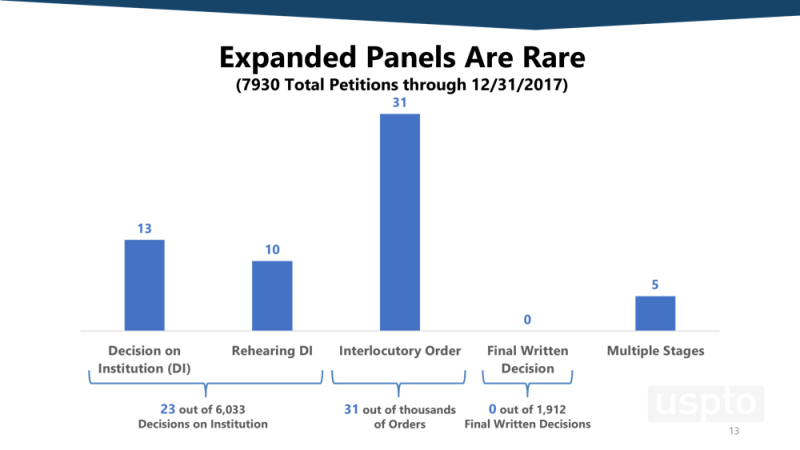
Expanded panels when they arose were empaneled to make a decision on the merits 80% of the time and on request for rehearing in the other 20%.
Data on the rationales for expanded panels were explicated in more detail.
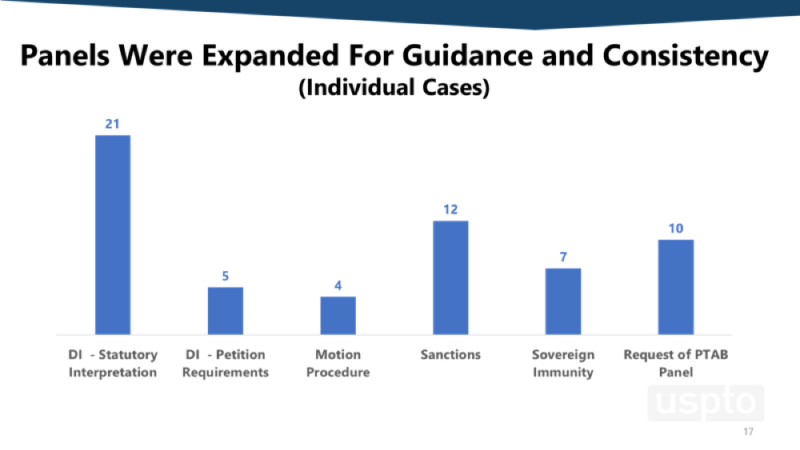
There were 21 instances where the panel was expanded at institution to consider questions of statutory interpretation.
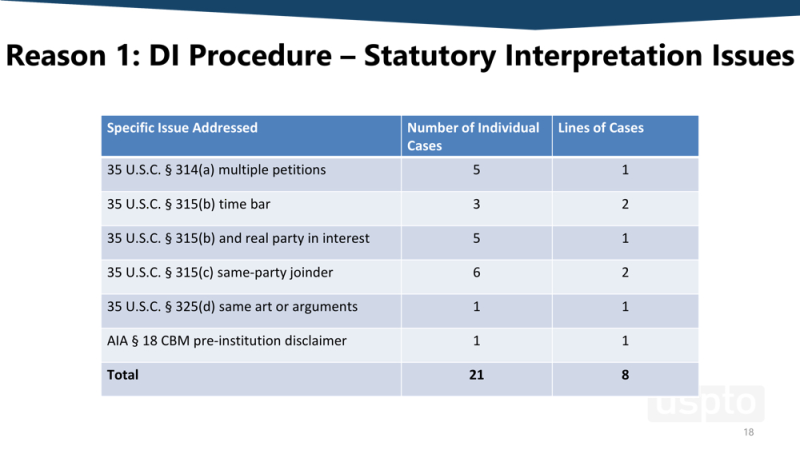
These included:
• § 314(a) Multiple Petitions: General Plastic v. Canon, Case IPR2016-01357, -01358, -01359, -01360, -01361 (PTAB Sept. 6, 2017) (Paper 19) (precedential) (vote from 3-0 to 7-0 with expansion on rehearing)
– Emphasizes the factors that the Board considers in deciding whether to exercise its discretion to deny a follow-on Petition in an AIA proceeding under 35 U.S.C. § 314(a).
• § 325(d) Similar Art/Arguments: Neil Ziegmann v. Carlis G. Stephens, Case IPR2015-01860 (PTAB Sept. 6, 2017) (Paper 13) (vote from 3-0 to 5-0 with expansion on rehearing)
– Emphasizes that prior art or arguments may be considered "substantially the same" under 35 U.S.C. § 325(d) if they are "cumulative to or substantially overlap with issues previously considered by the Office with respect to the patent."
• CBM Pre-Institution Disclaimer: Facebook v. Skky, Case CBM2016-00091 (PTAB Sept. 28, 2017) (Paper 12) (precedential) (vote from 3-0 to 5-0 with expansion on rehearing)
– Emphasizes that CBM patent review eligibility is determined based on the claims of the challenged patent as they exist at the time of the decision to institute, and that statutorily disclaimed claims must be treated as if they never existed for the purpose of institution.
Five instances arose at institution decision for questions of petition requirements.
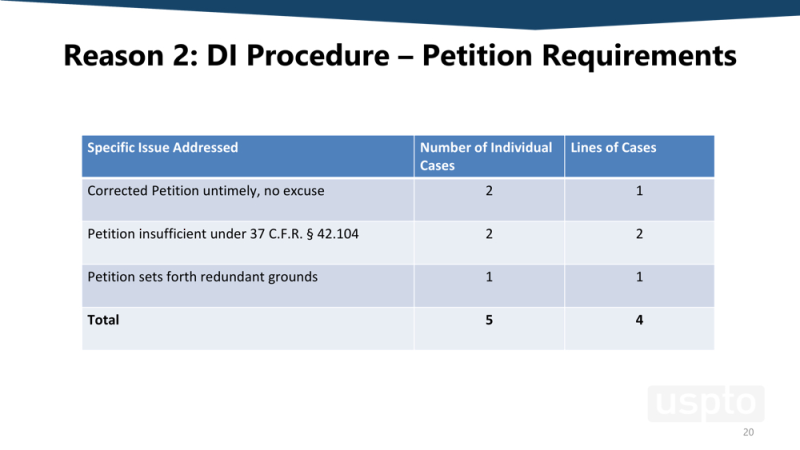
Four occurred on motion procedure.
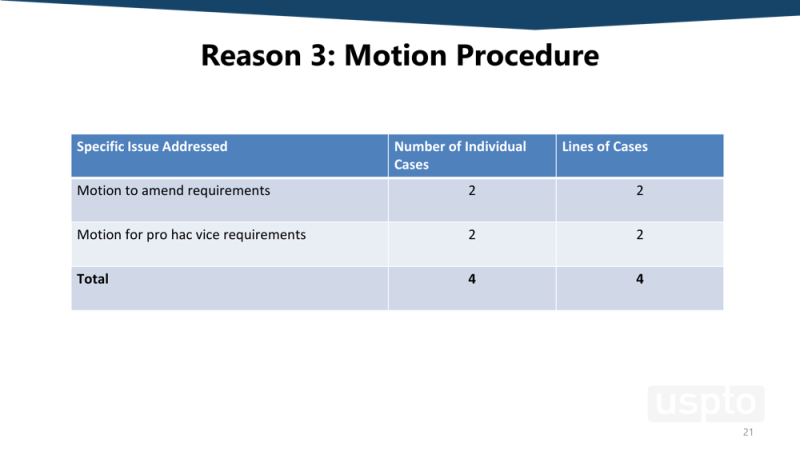
Twelve involved decisions to impose sanctions.
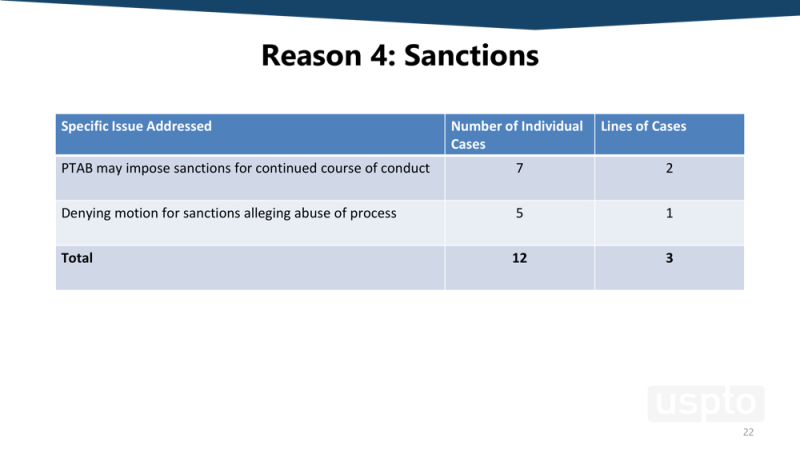
Seven involved questions of sovereign immunity; and ten were at the request of the PTAB panel. In these ten cases, HTC America v. Virginia Innovation Sciences, Case IPR2017-00870, -00871, -00872, -00873, -00874, -00875, -00876, -00877, -00878, -00879 (PTAB Sept. 13, 2017), the original panel suggested expansion to maintain uniformity due to substantial difference of opinion among the judges on a group of 10 related cases regarding an issue arising under 35 U.S.C. § 112(f).
With regard to the fourth question, the Chief Judge contended that the expanded panel came to the same conclusion as the original panel, with the exception of Target Corp. v. Destination Maternity Corp. (IPR2014-00508), and Nidec Motor Co. v. Zhongshan Broad Ocean Motor Co., No. 2016-2321, slip op. (Fed. Cir. Aug. 22, 2017).
The Chief provided these conclusions:
• Expanded panels are very rare
• Most expanded panel decisions issued as original decisions, not decisions on rehearing
• Panels were expanded for guidance and consistency:
• to provide forward-looking guidance on reoccurring issues; and/or
• to treat similarly situated parties the same
• Underlying result remained the same after panel expansion on rehearing, except for Target and Nidec, both of which address same-party joinder
Article I courts, and the PTAB in particular, have a legitimate goal: providing consistent application of the law to applicants and, in the case of implementing the adversarial avenues the AIA created, developing a consistent body of procedural and substantive law. To this end, for example, the PTAB has designated some (albeit few) cases precedential, thus providing notice to the public regarding how the Office can be expected to conduct the "trials" mandated by the statute. But the manner in which the Board has attempted to provide this consistency, in particular with regard to expanded panels in post-grant review proceedings, has provoked sufficient controversy that Chief Judge Ruschke felt it necessary (or at least politically expedient) to requisition a study and include the results in his "chat." The kerfuffle that has arisen over expanded PTAB panels is the direct result of the chimerical nature of the proceedings engendered by the Leahy-Smith America Invents Act. Characterized as "trials" in the rhetoric used to obtain passage of the Act, the various post-grant review instruments are more in the nature of "a specialized agency proceeding" as the Supreme Court noted in Cuozzo Speed Technologies v. Lee. Seen in this light the practice of expanding panels to ensure consistency of agency action would appear to have some merit. Seen as a trial, however, the overriding consideration is due process, wherein a patentee cannot be deprived of her property except in an adjudicatory proceeding where she has a fair opportunity to be heard without the deck stacked against her. The Office has been zealous in putting patents of purportedly dubious validity through the gauntlet of post-grant review. To many, the Board needs to be just as zealous in ensuring that patentees be deprived of their patent properties only if due process is followed as rigorously in the Office as it is in district court. It may be impossible to reconcile these two diverse mistresses intertwined in post-grant review, but if the Office does not, cannot, or will not, eventually the Supreme Court will.